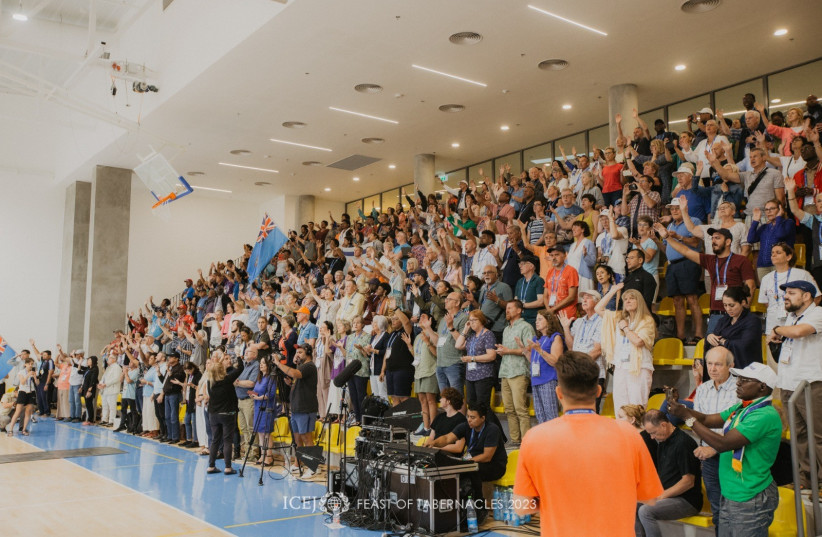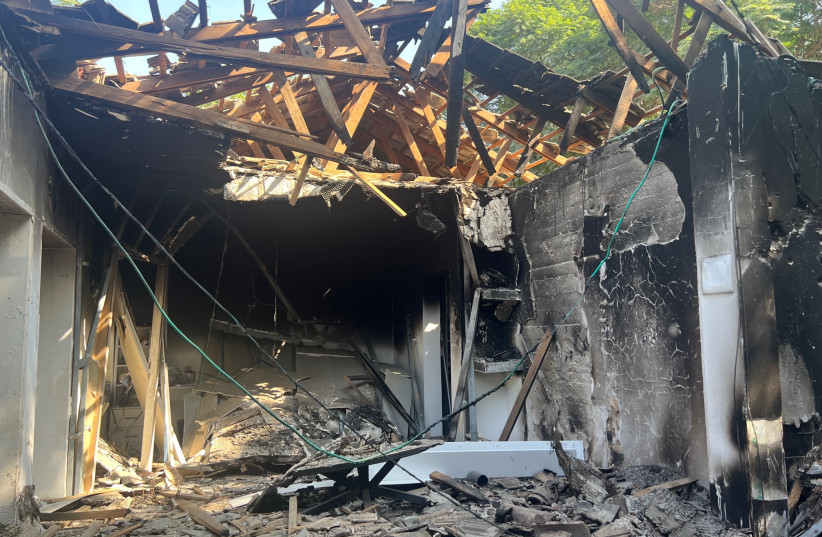Christians worldwide will come together during the winter season to plant 1,400 vibrant red tulips in remembrance of the 1,400 lives lost to Hamas terrorists on October 7, according to David Parsons, vice president and senior spokesman for the International Christian Embassy in Jerusalem.
Just two days before the Hamas massacre, ICEJ led a group of 700 Christian pilgrims to the Negev and along the Gaza border fence to dedicate the "Christian Embassy Nature Park," land that had been rehabilitated through Christian gifts in partnership with Keren Kayemeth LeIsrael-Jewish National Fund. The Christians had chosen to rehabilitate a section of Be'eri Forest that had been burned over recent years by Gaza arsonists launching fire kites and balloons from Gaza.
The 126-acre forest was replanted with native oak, eucalyptus and other broadleaf trees that are less flammable, provide plenty of shade, and grow fast even in the dry desert climate. At the dedication ceremony, ICEJ President Dr. Jürgen Bühler had said that the project was meant not only to be beautiful but to help "visibly shield Israelis from harm coming from Gaza."
KKL-JNF's Ronnie Vinnikov, head of KKL-JNF's resource development and external relations division, had said, "We heal the environment, and during the process, we have also established safety and security measures for the residents of the area."
Unbeknownst to them, a mere two days later, a group of terrorists breached the fence, wreaking havoc upon the serene forest and killing Israelis.

Parsons noted that Israeli tanks had also been traversing the area as part of their response. But he said he is not worried about the trampled flowers.
Time to replant
"There's time to replant," Parsons said. "You cannot regain the lives lost."
When the Christian delegation came to the Gaza border on October 5, they also took part in a mass solidarity rally at the local high school to encourage Israelis living along the Gaza border to learn resilience. That event was hosted by the head of the Sha'ar Hanegev Regional Council, Ofir Libstein, who became the war's first named casualty.
During his speech that day, Libstein said, "The people who live here in Sha'ar HaNegev, we are keeping the Land of Israel. We are keeping the border with the Gaza Strip… We have doubled our population in the last 10 years, and everything is with your help. Because with your help, we feel safe here. With your [bomb] shelters that you help us to buy and to put here in the area, we live better lives. And I promise to do everything to keep the Land of Israel and build it stronger."
Parsons said: "We had a relationship with Mayor Libstein and all the regional council leaders. We were the first ones to start putting mobile bomb shelters here – almost 150 – and to deliver firefighting equipment [to stop the balloon fires]. We've come down with the Jewish National Fund to replant some of the burned areas. We've invested millions of dollars."
As such, he said that October 7 "touched a raw nerve" for the pro-Israel Christian community that has dedicated so much of its efforts to restoring broken ties with the Jews after years of Christian persecution.
"This is unlike anything we've seen or endured or witnessed here in the land since ICEJ was founded 43 years ago," Parsons told the Post. "But we're committed to helping these communities rebuild."
Earlier this month, Parsons and a handful of other Christian leaders went down South to visit the scenes of the tragedy on a mission organized by the Knesset Christian Allies Caucus and its co-chair MK Sharren Haskel, including being briefed by the IDF on the likely events that led to the death Libstein, his mother-in-law and son.
In Kfar Aza, the bullets aimed at Libstein lay on the ground, while a crumpled blanket lay on the street in front of the house where he met his untimely demise.
"He came here to defend his own family," an IDF officer explained, pointing out Libstein's home.
"The ICEJ roundly condemns this evil and horrendous assault on Israel on a Jewish high holy day by Hamas and its patrons in Iran," Parsons shared that day among the ruins. "We have urged Christians worldwide to pray for Israel's safety."

Parsons said many of the people in Kfar Aza were peace-loving people who, like Libstein, wanted a better life for both Israelis and Palestinians.
"The Jewish people have faced this before and, somehow, they managed to survive – and today they have the IDF," Parsons continued. "I thank God that Israel has an army and a nation.
"We're going to stay with this nation and help do what is necessary to bring peace and security to the whole region."
